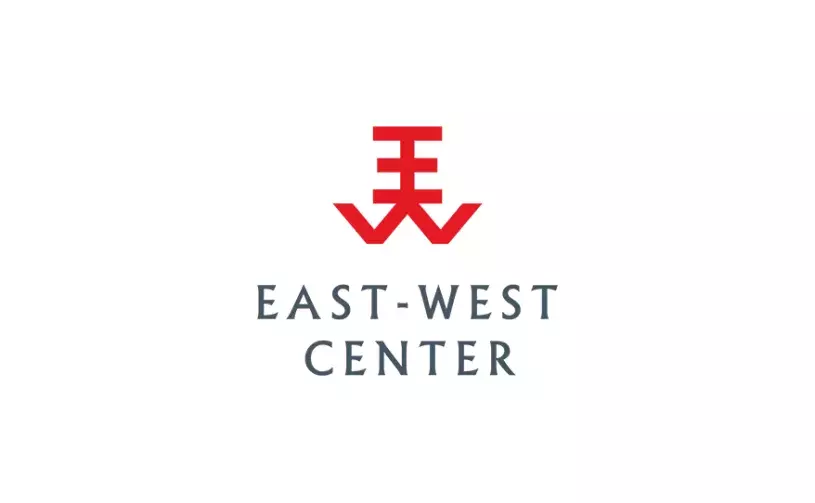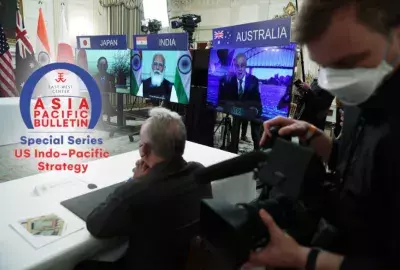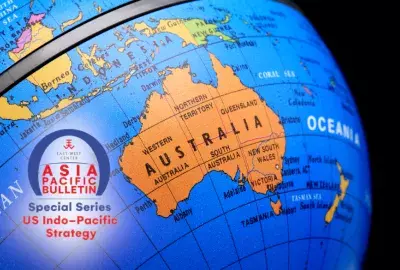Error message

|
Tirta N. Mursitama, Shidarta, and Yi Ying, of BINUS University in Indonesia, explain that “The scholarship and internship programs initiated by the Taiwanese government under NSP policies are parts of an innovative effort to strengthen the links between Indonesia and Taiwan.” |
The Taiwan government is increasingly aware of the need to improve its soft power by promoting inter-state and society cooperation in various fields, including education and tourism. This effort is manifest in the New Southbound Policy (NSP). In the field of education, Taiwan’s government has created the Industry Academy Collaboration Program for foreign students, which has fulfilled two purposes: helping Taiwanese universities recruit foreign students, and providing Taiwanese industries with skilled workers through internships in the scholarship program.
The talent exchange has shown promising results with the number of students from ASEAN countries increasing by as much as 1.9 percent compared to the previous year (2017). By this measure, Malaysia was ranked first (47.5 percent increase), followed by Indonesia (17.1 percent), and Vietnam (16.3 percent).
The increasing number of Indonesian students is due mainly to scholarship and internship programs, and since 2016 more than 500 Indonesian students from underprivileged families have received scholarships to take four year courses and internships in Taiwan. In the program, they are placed in companies across various industries, including contact lenses, plywood, electronics, software, steel mills, chemical plants, hotels, and resorts. The program’s success results from synergy between the ministry of education, universities, and industry.
Based on an October 2018 survey, students who receive these scholarships generally feel that the program is useful, and the program is also beneficial for Taiwanese universities, which gain access to foreign students. However, there are still problems to overcome.
For example, this program is offered to students from Indonesia by intermediaries representing Taiwan universities and industries. These intermediaries do not usually have enough knowledge about the socio-cultural conditions of the local community. To overcome this problem, they usually rely on school principals or teachers, which makes the recruitment process longer. Thus, there is a wide gap between the intermediaries and the students, and therefore potential for miscommunication. The intermediaries do not necessarily take the opportunity to explain the program and the conditions students will face while in Taiwan.
Additionally, there are pre-departure issues. Most of the participants are first-time travelers, and they can get confused when dealing with passports, visas, and other travel documents. This lack of experience means they often pay more, especially if they use intermediaries to assist with these logistics.
Problems can also arise after participants arrive in Taiwan. The universities and industries in Taiwan do not have sufficient knowledge about local Indonesian cultures. Additionally, due to the language barrier, these students tend to keep to their own groups rather than integrating with Taiwanese students. They prefer to speak Indonesian, or even their local, sub-national languages. This makes their adaptation process slower and sometimes difficult.
Misunderstandings sometimes touch sensitive areas. Most of the scholarship recipients from Indonesia are Muslim. When they arrive in Taiwan, there are obstacles in carrying out religious obligations, eating halal food, and finding appropriate accommodations. On Friday, male students must perform Friday prayers at mosques in distant locations. Alternatively, the university or industry must give them a special room for worship with a variety of facilities. If this is not fulfilled, there will be feelings of prejudice that Muslim students do not have the freedom to carry out religious obligations.
It is true to say that in most cases there have been improvements. In the last two years, the availability of halal food and prayer rooms have improved, which indeed reflects good intentions and learning on the part of Taiwan’s government, universities, and industries.
Nevertheless, there also are complicated legal problems linked to this exchange—often related to coordination within Taiwan itself. For example, in 2016, a college in Taiwan that provided scholarships, required that first-year students study for two days, and work for three days each week. The company requires students to work for four days and only study for one day. Companies argue that they already pay students' tuition fees and require students to spend more time on internships, working in factories, while universities demand that students have sufficient knowledge as a requirement to pass courses. A lack of synergy and communication between universities and industries has a negative impact on students. Not surprisingly, in 2018, forced labor issues emerged for the working students. There has been significant media coverage on this issue, as well as a debate among bureaucrats, politicians, human rights activists and academics. However, this case was successfully overcome by the Indonesian Economic and Trade Office in Taipei as well as the Taipei Economic and Trade Office in Jakarta. The Taiwan government has temporarily suspended the sending of participants by not issuing visas. Participants in the program were only recently granted visas, and there are additional requirements needed, namely attaching TOCFL (The Test of Chinese as a Foreign Language).
Going forward it will be important for the Taiwanese government to pay attention and clarify the work contracts between these students, universities, and industries. The contracts must be consistent with labor laws in both Taiwan and Indonesia. According to Indonesia’s labor law, Indonesian students who are apprentices can receive wages as long as the amount conforms with the local minimum wage.
The scholarship and internship programs initiated by the Taiwanese government under NSP policies are parts of an innovative effort to strengthen the links between Indonesia and Taiwan. Students are important agents in maintaining a valuable relationship from the perspective of people-to-people diplomacy. They are present in Taiwan as formal workers who are or will be highly educated and skilled, so their participation in this program is a matter of pride to their families at home.
Taiwan, therefore, needs to work carefully and fully within the island itself as well as with Indonesian partners to ensure good outcomes in this important component program of the New Southbound Policy.
|
Tirta N. Mursitama, Shidarta, and Yi Ying, of BINUS University in Indonesia, explain that “The scholarship and internship programs initiated by the Taiwanese government under NSP policies are parts of an innovative effort to strengthen the links between Indonesia and Taiwan.” |
The Taiwan government is increasingly aware of the need to improve its soft power by promoting inter-state and society cooperation in various fields, including education and tourism. This effort is manifest in the New Southbound Policy (NSP). In the field of education, Taiwan’s government has created the Industry Academy Collaboration Program for foreign students, which has fulfilled two purposes: helping Taiwanese universities recruit foreign students, and providing Taiwanese industries with skilled workers through internships in the scholarship program.
The talent exchange has shown promising results with the number of students from ASEAN countries increasing by as much as 1.9 percent compared to the previous year (2017). By this measure, Malaysia was ranked first (47.5 percent increase), followed by Indonesia (17.1 percent), and Vietnam (16.3 percent).
The increasing number of Indonesian students is due mainly to scholarship and internship programs, and since 2016 more than 500 Indonesian students from underprivileged families have received scholarships to take four year courses and internships in Taiwan. In the program, they are placed in companies across various industries, including contact lenses, plywood, electronics, software, steel mills, chemical plants, hotels, and resorts. The program’s success results from synergy between the ministry of education, universities, and industry.
Based on an October 2018 survey, students who receive these scholarships generally feel that the program is useful, and the program is also beneficial for Taiwanese universities, which gain access to foreign students. However, there are still problems to overcome.
For example, this program is offered to students from Indonesia by intermediaries representing Taiwan universities and industries. These intermediaries do not usually have enough knowledge about the socio-cultural conditions of the local community. To overcome this problem, they usually rely on school principals or teachers, which makes the recruitment process longer. Thus, there is a wide gap between the intermediaries and the students, and therefore potential for miscommunication. The intermediaries do not necessarily take the opportunity to explain the program and the conditions students will face while in Taiwan.
Additionally, there are pre-departure issues. Most of the participants are first-time travelers, and they can get confused when dealing with passports, visas, and other travel documents. This lack of experience means they often pay more, especially if they use intermediaries to assist with these logistics.
Problems can also arise after participants arrive in Taiwan. The universities and industries in Taiwan do not have sufficient knowledge about local Indonesian cultures. Additionally, due to the language barrier, these students tend to keep to their own groups rather than integrating with Taiwanese students. They prefer to speak Indonesian, or even their local, sub-national languages. This makes their adaptation process slower and sometimes difficult.
Misunderstandings sometimes touch sensitive areas. Most of the scholarship recipients from Indonesia are Muslim. When they arrive in Taiwan, there are obstacles in carrying out religious obligations, eating halal food, and finding appropriate accommodations. On Friday, male students must perform Friday prayers at mosques in distant locations. Alternatively, the university or industry must give them a special room for worship with a variety of facilities. If this is not fulfilled, there will be feelings of prejudice that Muslim students do not have the freedom to carry out religious obligations.
It is true to say that in most cases there have been improvements. In the last two years, the availability of halal food and prayer rooms have improved, which indeed reflects good intentions and learning on the part of Taiwan’s government, universities, and industries.
Nevertheless, there also are complicated legal problems linked to this exchange—often related to coordination within Taiwan itself. For example, in 2016, a college in Taiwan that provided scholarships, required that first-year students study for two days, and work for three days each week. The company requires students to work for four days and only study for one day. Companies argue that they already pay students' tuition fees and require students to spend more time on internships, working in factories, while universities demand that students have sufficient knowledge as a requirement to pass courses. A lack of synergy and communication between universities and industries has a negative impact on students. Not surprisingly, in 2018, forced labor issues emerged for the working students. There has been significant media coverage on this issue, as well as a debate among bureaucrats, politicians, human rights activists and academics. However, this case was successfully overcome by the Indonesian Economic and Trade Office in Taipei as well as the Taipei Economic and Trade Office in Jakarta. The Taiwan government has temporarily suspended the sending of participants by not issuing visas. Participants in the program were only recently granted visas, and there are additional requirements needed, namely attaching TOCFL (The Test of Chinese as a Foreign Language).
Going forward it will be important for the Taiwanese government to pay attention and clarify the work contracts between these students, universities, and industries. The contracts must be consistent with labor laws in both Taiwan and Indonesia. According to Indonesia’s labor law, Indonesian students who are apprentices can receive wages as long as the amount conforms with the local minimum wage.
The scholarship and internship programs initiated by the Taiwanese government under NSP policies are parts of an innovative effort to strengthen the links between Indonesia and Taiwan. Students are important agents in maintaining a valuable relationship from the perspective of people-to-people diplomacy. They are present in Taiwan as formal workers who are or will be highly educated and skilled, so their participation in this program is a matter of pride to their families at home.
Taiwan, therefore, needs to work carefully and fully within the island itself as well as with Indonesian partners to ensure good outcomes in this important component program of the New Southbound Policy.







